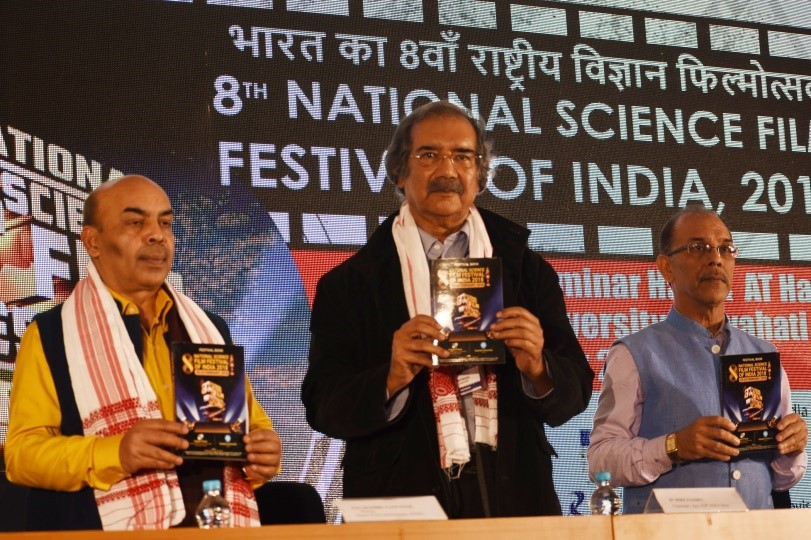
Science Films Can Help Promote Scientific Temperament
- News
- 1.6K
Over 200 films makers along with a large contingent of scientists, students and film critics from across the country have gathered here for the eighth edition of the National Science Film Festival of India (NSFFI) which began today at the P.D Hall of Gauhati University.
Inaugurating the five-day event, noted wildlife photographer and environmentalist Mike Pandey emphasized the importance of every living organism in maintaining the ecological balance and called upon science filmmakers to help foster awareness towards preserving biodiversity. “Nature is our mother and she is in danger. It is high time that we take appropriate action to save her.”

Mike Pandey (Centre) releasing the festival directory.
Nimish Kapoor, Director of NSFFI, said: “the aim of the festival is to promote scientific temperament so that one can think and act scientifically.” In all, 232 films were entered for the festival and of the 82 have been shortlisted for screening. The festival provides a platform for professionals, non-professionals, and student documentary filmmakers. The jury headed by three-time Green Oscar awardee Mike Pandey will select best films in various categories that would be given cash awards and citations.
A documentary showcasing the Forest-PLUS program of USAID/India in collaboration with the Ministry of Environment, Forests & Climate Change was screened as the inaugural film. Titled `Forest – Securing the Future’, the film documents experience of improving and managing the forested landscapes of the country, particularly to help mitigate the ill effects of climate change.
Twenty national and international organisations including UNICEF, IIT Guwahati, INDO-US Science and Technology Forum, National Council of Science Museums, CSIR-NISCAIR, British High Commission, Research Councils of UK, National Research Council – CNR Italy, Max-Planck-Gesellschaft, Germany India Office, Institute Francais (India) and Dr. Anamika Ray Memorial Trust are showing their films on science, technology, nature, health, technology, biodiversity and innovation.
Dr. Ankuran Dutta, Head, Department of Communication and Journalism, Gauhati University, said films screened during the festival would cover a wide spectrum of themes including health, water reservoir system, pollution, climate change and scientific achievements.
Vice Chancellor of Gauhati University, Dr. Mridul Hazarika, chaired the inaugural session. Dr. Manoj Kumar Patairiya (Director, CSIR-NISCAIR), Prof Sambhu Nath Singh (Director, School of New Media Studies at IGNOU) and Dr. Suresh Kumar Nath (Registrar, Gauhati University) also addressed the gathering.
The festival would also feature a number of workshops, panel discussions, and filmmaking classes. It has been organized by Vigyan Prasar under the Ministry of Science and Technology in collaboration with Gauhati University. (India Science Wire)
By Dr. T V Venkateswaran
For the latest Science, Tech news and conversations, follow Research Stash on Twitter, Facebook, and subscribe to our YouTube channel


